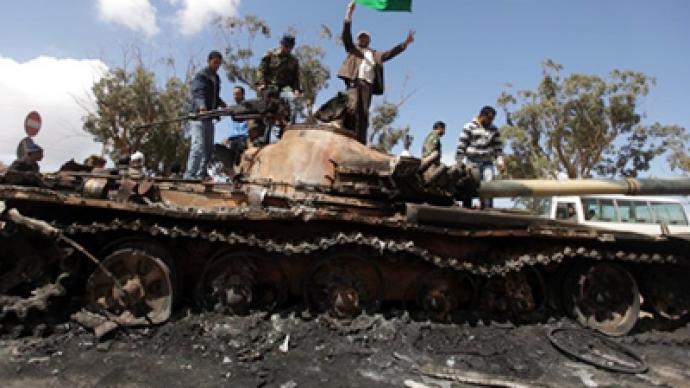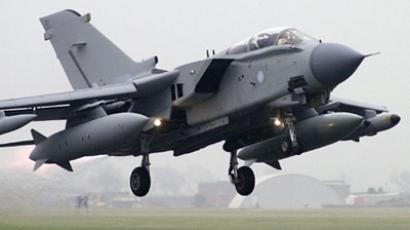Libya torn to pieces by rebels, Gaddafi and coalition – all for peace

Latest coalition air-strikes hit two Libyan naval bases and two airports, including a civilian airport in the city of Sert. As the operation unfolds, rebels have reinforced their efforts to recover the territory they have lost to Gaddafi’s forces.
The Libyan government’s announcement of a ceasefire, which came on Sunday in response to the UN Security Council’s resolution, hasn’t seemed to put an end to military operations.Heavy fighting reactivated in Libyan cities of Misrata, Az Zintan and Ajdabiya. The biggest struggle is unfolding in the city of Misrata, 200km East of Tripoli. The city is reported to have been surrounded by Gaddafi’s forces for four consecutive days. Government troops have been cutting off electricity, fuel and water supplies. Civilians are also reported to have been brought in from other areas to be used as human shields against the air strikes.
On Tuesday Gaddafi’s ground troops also resumed bombarding of Az Zintan, an oil port northeast of Tripoli. The town of Ajdabiya, which is the second largest rebel stronghold after Benghazi, is also besieged by Gaddafi’s forces and is waiting to be joined by more rebel troops which are approaching the city from Benghazi.The opposition forces have met with the UN Security Council’s representatives in the city of Tobruk to discuss the latest humanitarian efforts and concerns.Rebels are now planning to move west to fight back through cities they have lost to Gaddafi, with Tripoli the ultimate goal. They hope the international community will provide them with more air cover as they advance.
Meanwhile, a U.S. Air Force fighter jet has crashed in Libya due to a mechanical problem. Both crew members – the pilot and weapons officer – are said to be alive. They suffered minor injuries and landed safely in Libya. They have since left the country, a senior U.S. defense official said on Tuesday. The fighter jet flew to Libya as part of a coalition attack on the country which has been authorized by the United Nations Security Council.
Coalition’s operation ‘effective’ – US
France has proposed calling a new committee to work in Libya. A new political steering committee, outside NATO, should be called to oversee the no-fly zone over Libya suggests French Foreign Minister AlainJuppe according to AP reports. Alain Juppe says `this is therefore not a NATO operation'' as not all members of the military coalition are members of NATO. But, he says, the coalition would use NATO's ``planning and intervention capabilities.''Juppe suggests all foreign ministers of participating states such as Britain, France and the United States as well as the Arab League ought to take part in the new committee. It is expected to meet in the coming days, either in Brussels, London or Paris.The coalition forces had reportedly hit 124 targets by Monday morning. The operation is believed to have unfolded successfully. US Navy Vice Admiral William E. Gortney said that the back-to-back assaults on Saturday and Sunday had inflicted heavy damage.The operation has been keeping Gaddafi’s air forces on the ground, blocked his army's advance on the rebel stronghold of Benghazi and confused his forces in general."We judge these strikes to have been very effective in significantly degrading the regime's air defense capability," Gortney said, adding that it was believed Gaddafi's forces were under significant stress and suffering from both isolation and a good deal of confusion.More international fighter jets took off from bases in Europe on Monday. In the Mediterranean, military planes on the French aircraft carrier Charles de Gaulle are preparing to join in the international operation from Tuesday, according to the French military."The operations are going on well, in accordance with the plans and the goals decided by the international community," said General Philippe Ponties, a French Defense Ministry deputy spokesman. "I want to say that today, without a single command centre, we see that this coordination works very well and gives satisfaction. But, of course, working in a coordinated way facilitates planning and supervision of the operations a great deal."More countries are joining the coalition forces. Canada has sent four fighter jets and two refueling tanks. Qatar was the first Arab nation to join the mission, sending six fighter jets which landed in Crete.The first combat mission was initiated on Monday and carried out by British Typhoon fighters.The coalition is trying to extend the no-fly zone southward and westward, eventually to the capital, Tripoli, said General Carter Ham, head of US Africa Command on Monday. He added that the US was beginning to take a smaller role in the operation, as most of the missions on Monday will be carried out by non-US pilots.Ham also stated the coalition forces were not coordinating with opposition forces or providing them any air support, insisting their mission was strictly to protect civilians.The UN Security Council will discuss the latest development in Libya in its Thursday session.
On Tuesday NATO began to enforce an arms embargo against Libya.According to a NATO statement the alliance’s forces "will conduct operations to monitor, report and, if needed, interceptt vessels suspected of carrying illegal arms or mercenaries." It is also expected to help enforce the no-fly zone over Libya, the statement from NATO's secretary-general said.
However, Professor Hall Gardner from the Department of International and Comparative Politics at the American University in Paris says that Western forces can strike Gaddafi air power, but the real problem is that his forces on the ground can still do considerable damage.“They have at least, I would say, paralyzed Gaddafi to a certain extent, allowing the opposition movements to move back into positions held by Gaddafi…It is now clear that Gaddafi can hold out for much longer.”
Gaddafi’s palace under constant attack
Massive explosions were heard on Monday night in Tripoli. Gaddafi’s compounds were reported to be hit by two missiles. The coalition forces regarded the compound as the command and control centre of Gaddafi’s military operations. After the attack, the compound was absolutely destroyed."This is not a military place. It doesn't have weapons. It doesn't supply weapons. It's an official building," government spokesman Musad Ibrahim said in response to the attack.A small group of demonstrators gathered there on Monday morning chanting anti-coalition slogans and insisting that the international coalition forces had no right to interfere with Libya’s internal affairs.This all comes amidst reports of civilians’ deaths in the coalition’s air strikes. With yesterday’s death toll standing at 67 civilians, many people on the ground wonder if the international community’s involvement in Libya is truly reasoned.
A contributor to the Huffington Post news website, Robert Naiman, says there are some disagreements in the Western powers’ coalition and overthrowing the Libyan government could lead to “scary consequences”. “Clearly there are conflicting views: are we protecting civilians or are we engaged to fight for regime change? And obviously the idea of targeting Gaddafi and other Libyan government officials is dangerous because it does suggest regime change.”














